Completed research project
Over the last decade, more and more political advisors have offered “behavioral insights” in order to improve political regulation on both a national and an international level. They often claim to have developed new governmental techniques, drawing on results from behavioral economics. After first theoretical conceptualizations in the 1950s, behavioral economics has expanded significantly as a subfield of academic economics since the 1980s. The project assumed that behavioral regulation differs fundamentally from other governmental strategies, such as laws, economic incentives or educational efforts because it does not presume that subjects are rational, self-transparent beings with well-ordered preferences. Yet, behavioral techniques are not as new as their proponents often claim. The project analyzed the transdisciplinary emergence of a specific body of behavioral knowledge in the second half of the twentieth century, asking how regulatory approaches to human beings changed in the paradigm of behavior. Scrutinizing behavioral economics, communicative behavior, behavior therapy, consumption, and traffic behavior, it focused on questions concerning the relationship between normative orders and empirical descriptions of behavior, the difference between concepts of action and behavior as well as the respective understandings of subjectivity and rationality.

